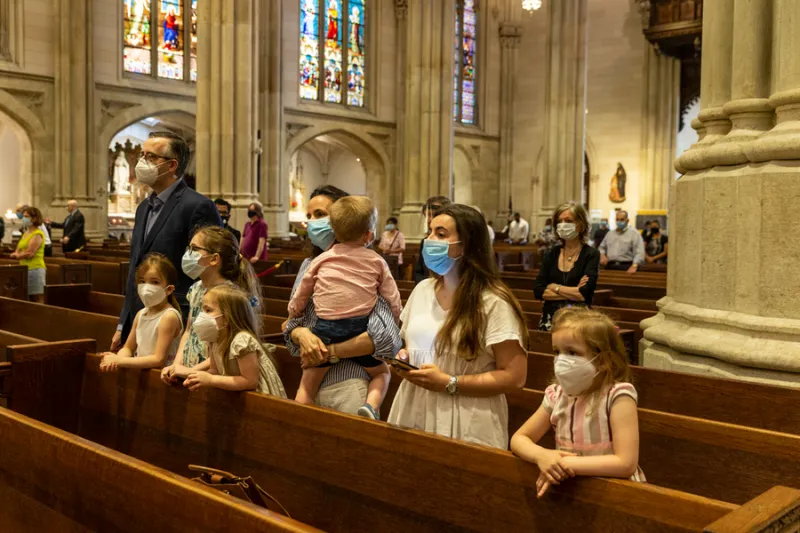
Buenos Aires, Argentina, May 20, 2021 / 20:01 pm (CNA).
The Catholic Lawyers Corporation of Argentina filed a writ of amparo on Tuesday contending that recent health regulations decreed during the Covid-19 pandemic “flagrantly violate” the free exercise of worship and religion.
An increase of coronavirus cases in April, especially in the Buenos Aires metropolitan area, which accounts for 40% of the country’s population, led health authorities to announce more restrictive measures through a Decree of Urgent Need April 30.
Through May 21, in areas with epidemiological and health safety alerts such as Buenos Aires Province, business hours and the hours when people may freely move about were restricted by the decree; sports, social, recreational, and religious activities in enclosed spaces were suspended, as were social gatherings of more than 10 people in public outdoor spaces.
The Catholic Lawyers Corporation filed their May 18 writ of amparo because, they maintain, the DNU “flagrantly violates the freedom of worship and religious freedom guaranteed in the National Constitution and in human rights treaties.”
“This has been a total suspension with no exceptions, not even by complying with limited attendance requirements and other protocols, an action which we consider prohibited by Article 27, paragraph 2, of the American Convention on Human Rights.”
The health safety decree violates “all the principles of necessity, proportionality and temporality established by the Inter-American Court of Human Rights and the Inter-American Commission on Human Rights,” the lawyers argued.
Regarding the restriction only to hold outdoor Masses with no more than 10 people, the Catholic Lawyers Corporation pointed out that this “causes greater harm than what is sought to be avoided because it exposes the faithful to inclement weather, thus risking their health.”
In their appeal, the lawyers also expressed their surprise that “the most traditional and sacred celebrations in the churches are prohibited, but not live television programs which are mere entertainment, which do not have any informative character.”
Bishop Alberto German Bochatey Chaneton, Auxiliary Bishop of La Plata, acknowledged May 15 the importance of safety precautions to avoid spreading the virus, but maintained there is “a primal human right to live our religiosity, our piety, our worship that the government of the day cannot grant or take away.”
Bishop Bochatey, head of the Argentine bishops’ healthcare ministry committee, said: “That belongs to the human being, it is a human right that goes beyond the world of governments and circumstances. The government, of course, has the proper authority to act during this time of pandemic” and to take measures to care for people’s health.
The bishop said that decreeing that only 10 people can attend an outdoor Mass, and no one can attend in an enclosed area, are measures “totally unresearched, disproportionate.”
Bishop Bochatey said that in a meeting with the Buenos Aires provincial government there was talk of “separating religious worship from other activities such as soccer, restaurants, plays, because worship is not just another thing, it has a totally different phenomenological nature and has to have its specific category.”
In addition, he pointed out that “worship is a much more stationary activity, people don’t touch each other, they stay in their place, the exchange of peace which is the only moment of interaction has been suspended for a long time,” and that therefore the possibility of contagion is greatly reduced.
The bishop therefore asked that the initial government regulation “of 30 percent of the church’s capacity” be maintained.
“We believe that some common sense is needed. We are serious, responsible people, all the parishes have bought thermometers, we have all the indicated equipment, we maintain social distancing, the pews have been marked off … we have done everything and, in fact, no one has been infected at Mass, so what we are asking is to have a little common sense and we hope we can get there,” Bishop Bochatey explained.
The bishops of Santa Fe Province expressed their “disconcertment and convinced disagreement” with the restrictive measures imposed by the provincial authorities invoking the DNU, in a May 11 letter.
“Adding restrictions is not the solution that our people expect and need to grow in personal and social responsibility,” they wrote.
“We understand the need to adopt sanitary measures to fight the pandemic, thus taking care of the health of our people. However, they must be applied with the utmost respect for the rights and guarantees enshrined in our National Constitution.”
“The religious dimension of the human person is an essential aspect of the integral well-being of the population and of strengthening the people spiritually; therefore, the measures and provisions taken by the authorities should always take care to safeguard it,” the bishops of Santa Fe Province said.
With a population of 45 million, Argentina has had more than 3.3 million confirmed cases of coronavirus, and more than 71,000 deaths. More than 9.5 million vaccines doses have been administered. The country has had nearly 159 deaths per 100,000 people, and nearly 7,460 confirmed cases per 100,000.
If you value the news and views Catholic World Report provides, please consider donating to support our efforts. Your contribution will help us continue to make CWR available to all readers worldwide for free, without a subscription. Thank you for your generosity!
Click here for more information on donating to CWR. Click here to sign up for our newsletter.




Leave a Reply